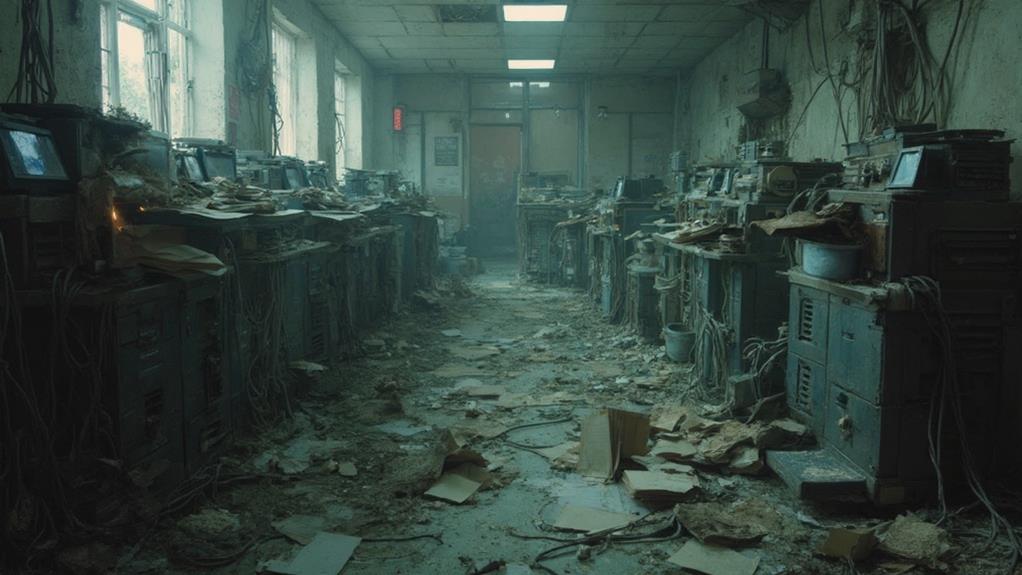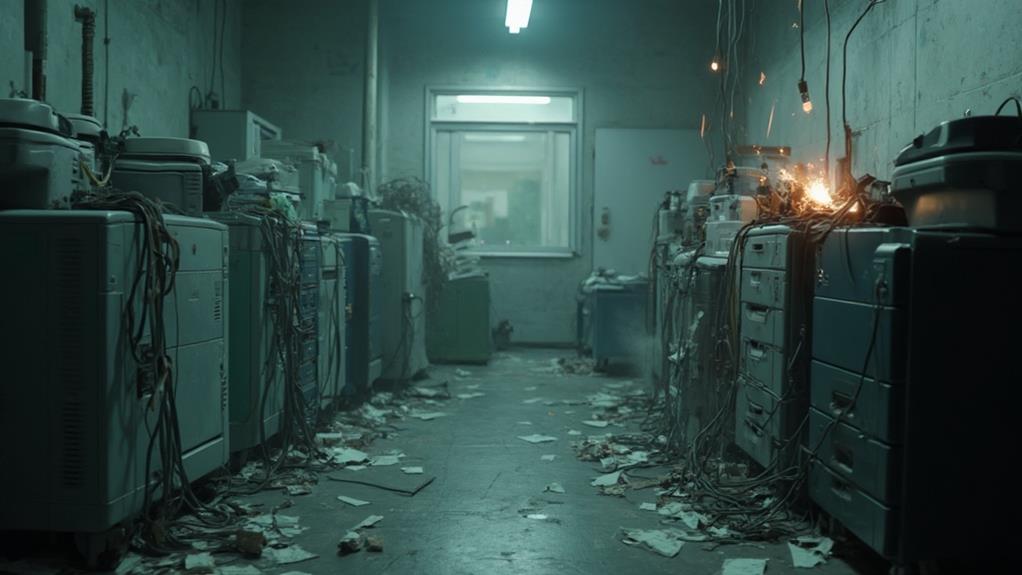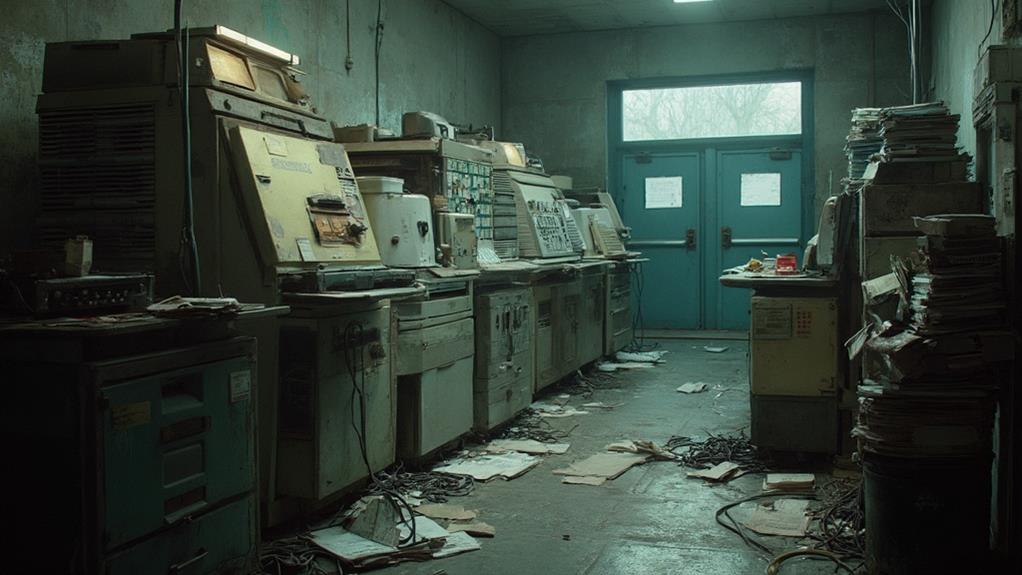Leasing copiers can pose significant challenges for businesses. The most notable disadvantage is the potential for higher long-term costs, as ongoing monthly payments can accumulate and surpass the cost of purchasing a copier outright. These agreements often include additional charges, such as interest and penalties for exceeding page limits, affecting budget consistency. Furthermore, leasing restrictions limit equipment customization, preventing businesses from tailoring the copier to their specific needs and often prohibiting any hardware or software modifications. Additionally, complex leasing contracts can have hidden clauses, bringing unexpected financial burdens. Comprehending these aspects is essential for making well-informed decisions.
MF Printer Lease Highlights
- Leasing typically leads to higher long-term costs than purchasing due to ongoing payments and interest.
- Lease agreements often limit customization, preventing alignment with specific business needs.
- The equipment may become outdated quickly, with restricted upgrade options.
- Complex contractual terms might include hidden fees and automatic renewals, affecting budgets.
- Early termination fees can impose significant financial burdens on businesses.
Leasing Copier Drawbacks

When businesses consider leasing copiers, they often encounter challenges such as potentially higher long-term costs compared to outright purchasing. These costs can be influenced by factors like copier model and features as well as lease term lengths, which can vary widely.
Additionally, leasing agreements typically limit the ability to customize equipment to specific needs, which can hinder operational efficiency. Furthermore, the complexity of contractual obligations can lead to misunderstandings and inflexibility, complicating business operations and financial planning.
Higher Long-term Costs
Leasing copiers often entails higher long-term costs than purchasing outright, primarily due to ongoing monthly payments that accumulate over time. Although leasing might appear attractive initially because it allows businesses to avoid substantial upfront costs, these payments can greatly exceed the purchase price of a copier throughout the lease term. For companies aiming to maintain financial prudence, it is vital to recognize these potential costs.
Leasing agreements frequently involve interest and fees, increasing the overall expenditure compared to buying. As a result, businesses find themselves committing a portion of their budget each month without building equity in the copier. At the lease's end, there is typically no return on investment beyond usage, unlike an owned asset that could be sold or further utilized.
Furthermore, exceeding page limits specified in many leases can incur additional charges, which add to the financial burden over time. These overage fees are often unexpected and can disrupt planned budgets, creating financial strain.
For organizations aiming for budget predictability and long-term financial health, considering the higher cumulative costs of leasing is of the utmost importance. Careful financial analysis can uncover whether leasing is truly advantageous or simply an inflated expense disguised by initial ease.
Limited Equipment Customization
While leasing copiers may offer a convenient solution for short-term needs, one significant drawback is the limited equipment customization that often accompanies such agreements. When organizations opt for leasing, they typically select from a range of pre-configured models offered by the leasing company. These options may not fully align with the specific operational requirements of a business, potentially restricting their ability to streamline workflows effectively.
Customization is often essential for growing businesses, seeking to incorporate features that cater specifically to their unique demands. However, lease agreements might prohibit modifications to the copier's hardware or software, limiting the organization's flexibility to adapt the device to specific tasks or integrate it with existing infrastructure. For instance, a business might require advanced scanning capabilities or additional trays to improve efficiency. Such bespoke enhancements may not be available under a leasing arrangement.
Moreover, as technological needs evolve, a leased copier may become outdated sooner than anticipated, with limited avenues to upgrade within the constraints of the existing lease. For companies focused on tailored solutions, the rigidity of leasing agreements can result in operational constraints. As such, leasing might not fully support the dynamic nature of evolving business environments.
Contractual Obligations Complexity
Beyond customization limitations, organizations leasing copiers must navigate the intricacies of complex contractual obligations. These agreements often contain clauses that require careful scrutiny to prevent unforeseen complications. Terms such as automatic renewal, maintenance responsibilities, and usage limitations can sometimes be hidden in dense legal language. This complexity necessitates a thorough understanding of the contract before signing to align with organizational needs and capabilities.
Leasing terms might impose specific restrictions that could affect operational flexibility. For instance, clauses may stipulate penalties for exceeding predetermined usage thresholds or additional charges for wear and tear. Additionally, early termination fees can pose significant financial burdens, complicating the organization's ability to pivot when necessary. A keen eye for detail is vital to recognize and negotiate these potential pitfalls.
Furthermore, organizations must consider the long-term financial implications. Leasing contracts, though offering the appeal of lower upfront costs, often result in higher overall expenditures. The cumulative effect of fees and restrictions can disrupt budgeting strategies, leading to unexpected financial strain over time. Consequently, engaging with leasing agreements requires not only initial diligence but also continuous contractual monitoring to safeguard the organization's interests and ensure sustainable operations.
Reliable Office Equipment Solutions for Your Business
At Reliable Office Equipment Solutions, we comprehend the significance of providing businesses with dependable and efficient office technology. With our extensive experience and extensive network of authorized office equipment dealers, we offer tailored solutions to help you avoid the potential pitfalls of leasing copiers by providing high-quality, cost-effective copier purchase options.
Our dedicated team works closely with our customers to understand their specific needs, ensuring ideal performance and reducing downtime with our top-tier maintenance and support services. By partnering with us, your business can benefit from improved productivity, minimized operating costs, and a seamless experience, enhancing your office workflow and keeping your operations running smoothly.
Benefits

While there are certain drawbacks to leasing copiers, it is important to recognize the distinct benefits that support this option for many businesses. Leasing can offer cost efficiency through predictable monthly payments, allowing businesses to better manage their budgets.
With dealers available nationwide, leasing provides flexibility for businesses across different locations. It also provides the ability to upgrade equipment as technology evolves, along with maintenance and support services that minimize downtime and operational disruptions.
Cost Efficiency Advantages
Leasing copiers presents several cost efficiency advantages that can benefit businesses of various sizes. One primary advantage is the ability to conserve capital. Instead of a significant upfront investment in purchasing a copier, leasing allows businesses to maintain steady cash flow with predictable monthly payments. This financial flexibility enables companies to allocate resources to other essential areas, fostering growth and stability.
Moreover, leasing often includes maintenance services, reducing unexpected repair costs. This comprehensive care package certifies machines operate at peak performance, minimizing downtime that could disrupt business operations. For organizations seeking to manage expenses effectively, this bundled service provides a reassuring layer of financial protection and support.
Additionally, leasing may offer tax advantages. Lease payments are often considered operating expenses, which can be fully deductible, potentially lowering the business's taxable income. This tax benefit provides an added layer of cost efficiency, making leasing an attractive option for budget-conscious companies.
In the competitive business landscape, operating with financial prudence is essential. Selecting a leasing model for copiers enables businesses to manage their finances wisely, ensuring they remain agile and competitive, without sacrificing quality or performance in essential office equipment.
Flexibility and Upgrades
In today's fast-paced business environment, flexibility is a crucial component that leasing copiers can provide. Leasing offers the opportunity to adapt quickly to changing business needs without the large up-front capital investment that purchasing requires. This adaptability facilitates easy upgrades, allowing businesses to stay current with the latest technologies.
As a business evolves, its needs for copier functionality can change; leasing agreements often allow for periodic upgrades to more advanced models, guaranteeing that the equipment aligns with the company's growth and operational demands.
Moreover, leasing offers adaptability not just in technology, but also in financial arrangements. Businesses can choose from various leasing terms, selecting options that best fit their financial strategies and cash flow objectives. This flexibility can contribute remarkably to a sense of stability and belonging within a professional setting, where efficient operations and modern tools are greatly valued.
Being able to upgrade equipment regularly means companies can maintain their competitive edge. Access to the latest features and functionalities can boost productivity and reduce operational bottlenecks. In an economy where innovation is key, leasing copiers ensures that businesses are better positioned to harness cutting-edge technologies, ultimately supporting their quest for success and inclusivity in the market.
Maintenance and Support Services
Beyond the advantages of flexibility and upgrades, the benefits of leasing copiers extend noticeably into the domain of maintenance and support services. This aspect often represents a major advantage for organizations, as it alleviates the responsibility of managing complex mechanical issues and guarantees continuous operational efficiency. Leasing agreements typically include thorough service plans that ensure timely and efficient maintenance.
Consistent Support: Lessees generally have access to a dedicated support team that is well-versed in handling copier issues, thereby minimizing downtime and enhancing productivity.
Cost Predictability: As maintenance is often included in the leasing contract, organizations can better predict monthly expenses, avoiding unexpected repair costs.
Latest Expertise: Lease agreements frequently provide that expert technicians are available, offering advanced knowledge and skill in troubleshooting and resolving problems.
Convenience: The lessee benefits from convenience as the leasing company often handles all aspects of service, from routine maintenance checks to emergency repairs.
This approach not only supports uninterrupted workflow but also fosters a sense of belonging among employees, who can rely on seamless operations without the stress of dealing with potential breakdowns. In conclusion, leasing copiers with inclusive maintenance and support services optimizes functionality and guarantees smooth business operations.
Budget Management Benefits
Effective budget management is a pivotal consideration for organizations, and leasing copiers offers a streamlined financial strategy. By opting to lease rather than purchase, companies can avoid substantial upfront expenditures, thus preserving capital for other essential business functions.
Leasing allows for predictable budgeting as it typically involves fixed monthly payments, which can align seamlessly with an organization's financial planning and cash flow management. This predictability is indispensable for maintaining financial stability, particularly for businesses aiming to allocate resources efficiently.
In addition, leasing copiers often includes maintenance and support within the contract, which can further contribute to manageable budgeting. Without unexpected repair costs, organizations can focus on their core activities, fostering a sense of security and belonging within the team as they work towards shared goals without financial disruptions.
Additionally, leasing arrangements can offer customization options to accommodate the specific needs of the organization, such as flexible terms or the ability to upgrade to newer technology. This adaptability guarantees that companies remain competitive and can keep up with technological advancements without additional capital investments, facilitating a cost-effective approach to equipment management in the dynamic business environment.
About JR Copier's Leasing History

JR Copier's leasing history reflects its adaptation to evolving market demands and challenges over the years. Their approach has included navigating the complexities of long-term lease evolution, addressing past contract challenges, and implementing service agreement adjustments to better serve their clients. Below is a table outlining these key focus areas:
| Aspect | Description | Impact on Clients |
|---|---|---|
| Long-term Lease Evolution | Changes in lease durations and terms | Enhanced flexibility and choice |
| Past Contract Challenges | Issues faced in previous leasing agreements | Improved transparency and trust |
| Service Agreement Adjustments | Modifications to service and maintenance terms | Increased satisfaction and reliability |
| Market Demand Response | Aligning offerings with client needs | Tailored solutions and offerings |
| Future Prospects | Anticipated adjustments and strategic planning | Long-term benefits and innovations |
Long-term Lease Evolution
Over the years, the leasing landscape for copiers has undergone significant transformation, particularly reflecting on JR Copier's strategic journey. This evolution traces a path of adaptation within an ever-shifting market, marked by technological advancement, and shifting customer needs. As leasing models have matured, JR Copier has responded by refining its offerings and business strategies to stay ahead of industry trends, hence forging strong partnerships with its clients.
In examining the evolution of long-term leasing at JR Copier, a few pivotal factors emerge:
- Technological Advancements: The rapid pace of technology has required constant updates to leased copiers, demanding a nimble approach to asset management.
- Customer-Centric Focus: Understanding the unique needs of each customer has driven changes in lease terms, allowing for tailored solutions that foster long-term relationships.
- Financial Adaptability: Economic fluctuations have influenced lease structures, encouraging adaptable leasing plans that provide financial predictability for both JR Copier and its clientele.
- Sustainability and Innovation: A commitment to reducing environmental impact has led to more energy-efficient leasing options, aligning with an increasing corporate focus on sustainability.
Ultimately, JR Copier's long-term lease evolution reflects a proactive stance in refining practices and remaining connected to the dynamic demands of its customer base.
Past Contract Challenges
While the evolution of long-term leasing at JR Copier has been marked by strategic adaptability and innovation, the path has not been free of hurdles. In JR Copier's leasing history, several past contract challenges have emerged that reflect the complexities inherent in leasing agreements.
One primary issue has been the rigidity of long-term leasing contracts, which sometimes hindered flexibility. Clients with rapidly evolving business needs found themselves constrained by agreements that did not allow for easy adjustments or premature terminations without significant penalties. This rigidity highlighted the necessity for more adaptable terms that accommodate changing demands.
Additionally, there were occasions when contract terms were misunderstood by clients, leading to dissatisfaction. Miscommunication about specifics such as maintenance costs, upgrade eligibility, or end-of-lease options frequently led to client disappointment. These misunderstandings often emerged from intricate contract details that some clients found hard to navigate. Such challenges underscored the importance of transparent communication and clear, concise explanations of contract provisions.
In some instances, economic downturns posed additional challenges, impacting customers' ability to meet contractual financial obligations. These scenarios often resulted in the need for renegotiation, further complicating existing agreements. Addressing these fundamental issues has been pivotal in refining JR Copier's contract processes.
Service Agreement Adjustments
Recognizing the need for greater flexibility, JR Copier has actively revised its service agreements to better align with client expectations and market dynamics. These adjustments, aimed at fostering a sense of belonging among their clients, underscore a commitment to transparency and adaptability.
Service agreements are an integral component of leasing arrangements, often influencing the overall perception of a leasing experience. To enhance client satisfaction, JR Copier has introduced several key changes:
- Customizable Terms: Clients now have the option to tailor terms to better fit their unique operational needs, promoting a sense of ownership in the leasing process.
- Flexible Payment Options: A variety of payment structures are available, enabling clients to choose a plan that best suits their financial forecasts.
- Enhanced Support Levels: JR Copier has expanded its customer support services, ensuring clients receive prompt assistance whenever issues arise with leased equipment.
- Proactive Maintenance Initiatives: Regular, scheduled maintenance checks are integrated into agreements, minimizing the potential for unexpected equipment downtimes.
Connect With A Team Member Today!
Ready to make an informed decision about your copier needs? Whether you are considering buying, renting, or leasing options, our team is prepared to offer flexible acquisition solutions with financing options tailored to meet your budget.
Connect with a team member today to explore the best options for your business. Our experts are here to help guide you through the leasing process and find the most efficient solution tailored to your requirements. Call us now at (888) 331-7417 and take the first step towards optimizing your office equipment strategy!
Office Equipment Lesing FAQ
What Hidden Costs Are Associated With Leasing Copiers?
When leasing copiers, potential hidden costs may include maintenance fees, early termination penalties, escalating lease payments, and charges for exceeding usage limits. Understanding these aspects guarantees informed decision-making and aligns budget expectations with actual expenses, fostering organizational cohesion.
How Does Copier Leasing Impact Long-Term Business Budgets?
Copier leasing can dramatically affect long-term business budgets by creating predictable monthly expenses. However, it necessitates diligent financial planning to accommodate potential overages, maintenance responsibilities, and future upgrades, ensuring sustained operational efficiency and cost-effective resource management.
Are There Limitations on Custom Copier Configurations in Leases?
In copier leases, customizing configurations can be limited by contractual terms, affecting the ability to tailor equipment to specific needs. This often requires balancing standardized options with the unique demands of capturing operational efficiency and workplace cohesion.
What Is the Typical Process for Early Termination of a Copier Lease?
The typical process for early termination of a copier lease involves notifying the leasing company, reviewing contractual obligations, paying any applicable fees, and returning the equipment. Ensuring compliance with these terms fosters successful relationships with your leasing partners.
How Often Can Lease Terms and Rates Change Unexpectedly?
Lease terms and rates for copiers may change unexpectedly due to market fluctuations, credit assessments, or renegotiations. Staying informed and maintaining clear communication with leasing providers [ALTERNATIVE WORDS] safeguards alignment with organizational goals and financial planning strategies.
